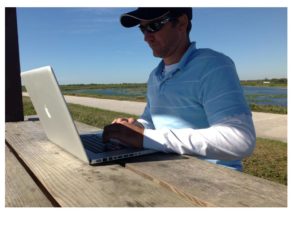
I would like to share a story with you that will explain why your digital profile matters. It is a story about the future and where we are headed.
Special thanks to Jeff Gammons for the photo, he was working Friday morning near the Florida Coast.
Spring 2020
Payton Muse runs his robotics business from an Android tablet that is synced to his phone. From the cloud he manages his business and personal life. He owns two homes one in Berkley, California and a vacation home in Lombok, Indonesia. Payton has not used a desk top computer in six years.
He manages a multi-million dollar company with factories in Asia and Latin American with less than 1000 employees. The majority of his employees are non-human robots; his company uses robots to build other robots for the company’s global clients.
Robotics and technology were new to Payton. He studied finance at Duke and worked as a securities trader for a large Wall Street firm. In January 2009, Payton and his fellow co-workers were layoff as a result of the 2008 recession. Payton moved in with his college buddy who also worked in New York City. Seth was an IT specialist for a large company in Manhattan and convinced Payton to change his career.
Payton could see how the Internet was changing everything. He continued to hang out and have drinks with several of his Wall Street friends. Two friends were quant traders for large institutional hedge funds. His girlfriend, Sophia, was a social media marketer for a startup company. They would spend hours talking about technology and potential business opportunities.
In 2010, Payton and Seth launched a robotics company. Payton was the salesman and Seth developed the technology. Sophia helped Payton and Seth with marketing and social media. She built strong online digital profiles for both as she understood the importance of digital branding and communication.
Payton’s Klout score helped secure the first round of funding and Kickstarter supplied the rest of the capital. The company used Square for digital payments and interns searched the Internet for apps and services that increased efficiency and saved money.
In 2012, Seth left the company to launch a 3-D printing venture; Payton was one of the initial investors. Payton and Sophia got married and moved to California. In 2014, Sophia started working at a think tank to help companies adapt to the new economy.
By 2020, all of Payton’s business and personal needs are managed via the Internet. His team uses the vast online cloud services to manage every aspect of the business. He retains campus2careers to handle the company’s recruitment for talented individuals.
Campus2careers uses algorithms to successfully find the ideal employees for Payton’s company and clients around the world. Candidates are required to have a digital profile for employment.
Payton’s son, Branson, created a digital profile for campus2careers when he was 14. Branson takes online classes and earns credits and skill badges from different online school platforms. Once Branson completes the required high school skills he will obtain recommendations from campus2careers to advance his education and skill set.
Many of the universities went bankrupt in 2016 and the U.S. Government took control of several large universities. For-profit startup educational services were launched to match the growing market need of online education.
Educational services award skill badges to students in all disciplines from accounting to technology. Employers post skill and badge requirements online for students. This posting system serves as an initial check list for students. Certificates and skill badges are posted to the person’s digital profile.
As 2020 comes to a close, our online digital profile has replaced the resume, business card and personal ID cards. Bank loans, car rentals, hotel rooms and more are booked via our digital profiles. We use thumb readers to log into Internet to work, pay bills and shop.
Back to February 2013
For most of us, thinking about 2020 is the last topic on our mind. We are focused on work, families, grocery shopping and the upcoming Super Bowl. Even looking back to 2006, can feel like a blur for most of us. Can you remember life without Twitter or Facebook?
Most of us think of social media as a marketing function or something my sister does at such and such company. Yet, social media is a disruptive emerging digital technology that is changing how we communicate. Some thought leaders believe that social media is rewiring our brains.
We must learn to adapt and use these new technologies to our advantage. Every day I read an article or blog discussing the importance of maintaining your social profile. Recruiters talk about how they spend hours on LinkedIn and Twitter looking for the ideal candidate.
Back in the Industrial Revolution, individuals built professional reputations and business networks to secure new employment or clients. Today, social media has digitized our professional reputation for the world to see. Now, the good, bad and ugly can be seen by everyone and we have less control over what others say and post.
With the digitization of our reputation, creating and maintaining a strong digital profile matters more now than ever before. By building a strong self-brand we are securing our place on the long tail of the Connected Economy.
To be heard, we all must create a digital self-brand. Our online and offline worlds have merged and everything is now transparent. Thomas Chamorro-Premuzic talked about creating a self-brand that rises above the noise of the human capital. I put my spin on his quote – creating a digital brand is about being a loud unique signal that is artfully crafted to rise above the digital clutter.
Be unique, be an artist. Check out this artfully crafted digital resume.